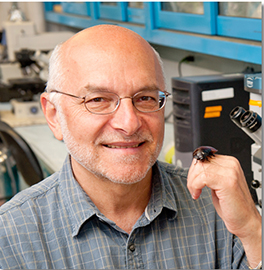Coby Schal

Professor
Department of Entomology and Plant Pathology
Gardner Hall 3107
919-515-1821 coby_schal@ncsu.eduBio
Our lab takes an integrative approach to urban entomology, with studies ranging from molecular and cellular investigations to pest management and community-wide interventions. Our goal is to address the public health, veterinary, aesthetic, and economic needs of residential, industrial and agricultural communities by developing and disseminating information on pests of homes and other human- built structures. We focus much of our Urban Entomology research on cockroaches and bed bugs. In addition, our broad interests in chemical ecology, behavioral endocrinology, and insect physiology include studies of moths, mosquitoes, sand flies, ants, termites, and bees. In the area of chemical ecology, we are especially interested in sex pheromones that are used in mate-finding, recognition and mate choice, and aggregation pheromones that mediate group formation. In collaborative studies we are examining semiochemicals that mediate oviposition activities of Aedes mosquitoes and Phlebotomus sand flies, and the evolution of pheromone communication in moths. In this area, our lab offers instrumentation and expertise for graduate students and other researchers at NC State. The lab is interested in the medical importance of cockroaches and bed bugs. We are investigating the function of allergens in the biology of the cockroach, the effect of cockroach control on allergen concentrations in homes and schools, and the effects of bed bug-produced contaminants on human health. We are using RNA interference approaches to silence genes that produce allergens in an effort to understand the functions of these proteins in the cockroach. In collaborative studies, we are using molecular markers to understand the genetic structure of cockroach and bed bug populations in both urban and agricultural settings. Our efforts to develop innovative approaches include studies of the efficacy of various interventions, bait acceptance, and insecticide resistance in field-collected cockroaches and bed bugs. Neuroethological studies of gustation use behavioral assays and electrophysiology to understand the mechanisms that underlie sugar-aversion as a behavioral resistance mechanism in cockroaches. Using bioassays and molecular techniques we are evaluating the incidence of resistance in NC and throughout the U.S.
Research:
- Biology and integrated management of urban pests, with emphasis on cockroaches.
- Chemical ecology, especially pheromone-medicated communication in cockroaches and developing tools for monitoring pest populations.
- Biology of cockroach allergens and mitigation strategies to reduce environmental allergen concentrations.
- Cuticular hydrocarbons: Biosynthesis, hemolymph transport, role in behavioral interactions.
- Behavioral endocrinology and regulation of the cockroach corpora allata and juvenile hormone production.
- Monitoring insecticide resistance in field-collected cockroaches.
- Sexual selection and mate-finding tactics in pest and tropical cockroaches.
- Our lab also collaborates with others on:
- Evolution of pheromone communication in moths (Gould, Groot)
- Oviposition attractants in mosquitoes (Apperson)
- Population genetics of cockroaches and bed bugs (Vargo, Mukha)
- Nestmate recognition in ants (Silverman)
- Insect Behavior (ENT 520), 3 credits
- Seminar in Urban Entomology (ENT 690Y), 1 credit
- Seminar in Chemical Ecology (ENT 690X), 1 credit
Research Impact Dashboard
Area(s) of Expertise
Urban Entomology, Insect Behavior, Chemical Ecology, Insect Physiology
Publications
- Cockroach gut microbiota is a significant source of endotoxin, a risk factor for asthma in cockroach-infested homes , Journal of Medical Entomology (2026)
- Influence of hematocrit variation on Cimex lectularius (Hemiptera: Cimicidae) development and reproduction , Journal of Medical Entomology (2026)
- Two Metschnikowia nectar yeast species have similar volatile profiles but elicit differential foraging in bee pollinators , Ecological Entomology (2026)
- An odorant-binding protein functions in fire ant social immunity interfacing with innate immunity , Open Biology (2025)
- Bed bug preferences for host odor or aggregation odor are differentially modulated by physiological state in various odorscapes , Pest Management Science (2025)
-
Deployment and transcriptional evaluation of nitisinone, an
FDA ‐approved drug, to control bed bugs , Pest Management Science (2025) - First evidence of the A302S Rdl insecticide resistance mutation in populations of the bed bug, Cimex lectularius (Hemiptera: Cimicidae) in North America , Journal of Medical Entomology (2025)
- Indoor allergens and endotoxins in relation to cockroach infestations in low-income urban homes , Journal of Allergy and Clinical Immunology Global (2025)
- Repellency and toxicity of long-lasting insecticide-treated bed nets (LLINs) to bed bugs , PLoS ONE (2025)
- Two Metschnikowia nectar yeast species have similar volatile profiles, but elicit differential foraging in bee pollinators , DRYAD (2025)
